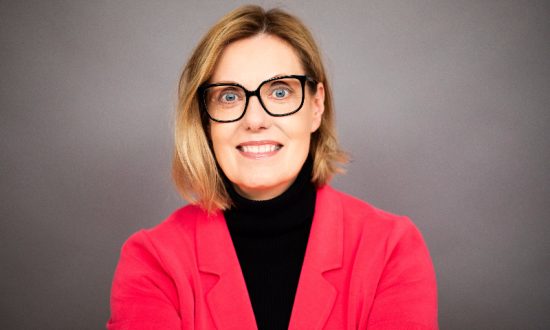Dorothée Töreki is a keynote speaker & inspirational influencer, passionately crafting stories about technology with heart and without dogma. After 20 years in the industry, she has experienced the entire range of technologies and work methodologies: from monolithic applications to agile microservices, from patriarchally led companies to networked transparent collaboration at eye level with high personal freedoms and the assumption of responsibility. Dorothee feels to have experienced very many facets of digital transformation first-hand. She knows what she is talking about. Despite all the change, there is one constant: technology and the opportunities to change our world for the better have always excited her.
Recently, in an exclusive interview with Digital First Magazine, Dorothée shared her career trajectory, her top tips on driving successful digital transformation, thoughts on ChatGPT and its impact on the field of data science, personal female role model, words of wisdom, and much more. The following excerpts are taken from the interview.
Dorothée, please tell us about your background and areas of interest.
My heart has always been captivated by technology, which is why I became a civil engineer specialized in municipal water management. Eventually, information technology intrigued me even more, prompting me to make a career change. Fortunately, this led me to Big Tech, and I spent 11 years at IBM supporting companies through their digital transformation. Today, I work independently, providing impulses, keynotes, and workshops, primarily on Generative AI. I am fascinated that we live in a time where we can shatter the limits of our possibilities, both as a society and individually. We can turn thoughts into concrete images, and we have a tutor by our side who not only has access to the knowledge of humanity but can also assist us with everyday questions: Is the tone of my cover letter appropriate, have I expressed myself clearly? These are just a few examples.
Many companies are currently undergoing digital transformation processes – what are your tips on a successful digital transformation?
Digital transformation is more than a technological upgrade; it’s a radical rethinking of organizational structure and teamwork. The world is changing, and rigid industrial business models are becoming obsolete. To thrive, companies must embrace interdepartmental collaboration and knowledge sharing. This new era demands freedom for individual initiative and a leadership that fosters such a culture. In the face of history’s most rapid changes, we must center our strategies on people, which is the true heart of interconnectedness and self-reliance.
Technology and transformation are not ends in themselves; they interact with us as humans and the way we perceive the world.
Specifically, this means: New products and services are like a journey into an unknown land. We learn by doing. This means that engineers must see with their own eyes how the product is created. Financial experts need to come down from the ivory tower of budget approval and engage in constant communication with sales, research, and customers. All of this very trivially means that we must understand the language of others.

If you were a CEO of a traditional company that wants to become AI-driven, what would be the first business problem that you would use AI to solve?
Counter-question: How exactly is ‘AI-driven company’ defined? From my perspective, there’s only one attribute that’s truly important: A customer-oriented company that wants to offer the best experience for their clients. If AI helps with that, wonderful. But AI is not a value in itself. In this spirit, I would examine everything the company does to see if I can improve it. Of course, AI will play a role in this.
The first step would be to automate and digitize processes. This initial phase allows us to gather experience in cross-departmental collaboration and break down silos. We learn how to collaborate with different perspectives and approaches.
The second step would enhance customer interactions: understanding the true needs of the customer and how we can fulfill them more swiftly and with higher quality. We must consider whether we have the right data, if we are permitted to use it, or if we need different data and where to source it. Here again, breaking down silos is crucial, requiring collaboration between IT, sales, product development, and legal teams.
The third step involves developing new business models, utilizing the collaborative practices established in the previous stages.
What are your thoughts about ChatGPT? Do you feel that data science jobs may become obsolete or can the AI chatbot help data scientists in diligent tasks?
My views on ChatGPT and its impact on the field of data science are quite optimistic. Far from rendering data scientists obsolete, I believe AI will amplify their importance. However, the nature of their tasks will evolve. Data scientists will need to collaborate closely with other departments, fields, or even different companies to tackle significant challenges:
Do our datasets contain inherent biases, and how can we identify them?
What rules govern the large language models we aim to utilize? Do we need to establish new or different rules? Research and clarification on related topics: Do we need open-source LLMs, and what are the legal implications of using closed-source technology such as OpenAI?
What data do we truly need to solve specific problems?
Data scientists have the potential to become the pivotal junction in an AI-driven company, provided they embrace the multifaceted nature of these questions and can synergize the various perspectives involved.
Are there any challenges that you have faced as a woman working in this field? Do you think there are enough opportunities for women in the tech field?
I have the direct comparison to another very male-dominated industry: construction. I have never regretted making the switch. In comparison, the information technology sector is characterized by companies that are very open. I have very rarely encountered reservations because I am a woman. From my point of view, all doors are open to women, especially in IT. I have been practically taking advantage of the opportunity to work from home for 15 years now. The IT industry has always been far ahead in this respect. This provides more freedom in balancing career and family. Additionally, in this field, I encounter many women who serve as role models and have not planned their careers in a straight, steep ascent, but rather in ‘curves’ depending on their life situation.

How do you expect AI to develop in the future?
I anticipate that AI will evolve in three key areas: integration, specialization, and ethical governance.
Firstly, AI will become increasingly integrated into our daily lives to the point of near invisibility, embedded in the devices and systems we use every day. This will further simplify and automate the way we live and work.
Secondly, there will be a trend towards increased specialization. AI systems will be developed with greater specificity and customization for particular industries and professions, leading to more precise solutions and fostering innovation in fields not yet fully explored by AI.
Thirdly, ethical frameworks for AI development and deployment will come to the forefront. Societal debates and regulatory requirements will drive the advancement of responsible AI systems that ensure fairness, transparency, and privacy.
These developments will necessitate a deep understanding of technology, critical thinking, and interdisciplinary collaboration to harness AI’s potential fully while managing its risks.
What one achievement or task in your career are you most proud of?
That as a rather introverted and shy individual, I’ve made it onto the big stages and not only do people listen to me, but I can inspire them.
How do you stay up to date with the latest trends in technology?
My enthusiasm leads me to continually try out the latest developments myself, I follow the key figures in the industry, and, of course, daily exchanges with colleagues and customers. There, I get to see firsthand how cutting-edge technologies are being applied on a daily basis.
What is your secret to striking work-life balance?
I’m still searching for it.
Growing up, who was your female role model and why?
As a teenager, I had no female role model; there were none. Today – in the age of social media and a hyper-connected world – I have, of course, discovered wonderful women.
One of them is Sabine Hossenfelder. She is a theoretical physicist and a master at explaining extremely complex topics dealing with the fundamental issues of our universe’s existence in a way that not only everyone can understand, but also dives into new worlds with enthusiasm. She has shown me what is possible through language: making technology approachable.
What would you advise the young women deciding to enter the tech industry?
Surround yourself with resource-oriented people: Those who focus on overcoming obstacles instead of complaining about them. You are capable of much more than you believe today. To get there, you must step out of your comfort zone. That is a conscious decision. Surround yourself with people who give you honest feedback. Accept criticism only from people who have proven that they have implemented what they are telling you.






